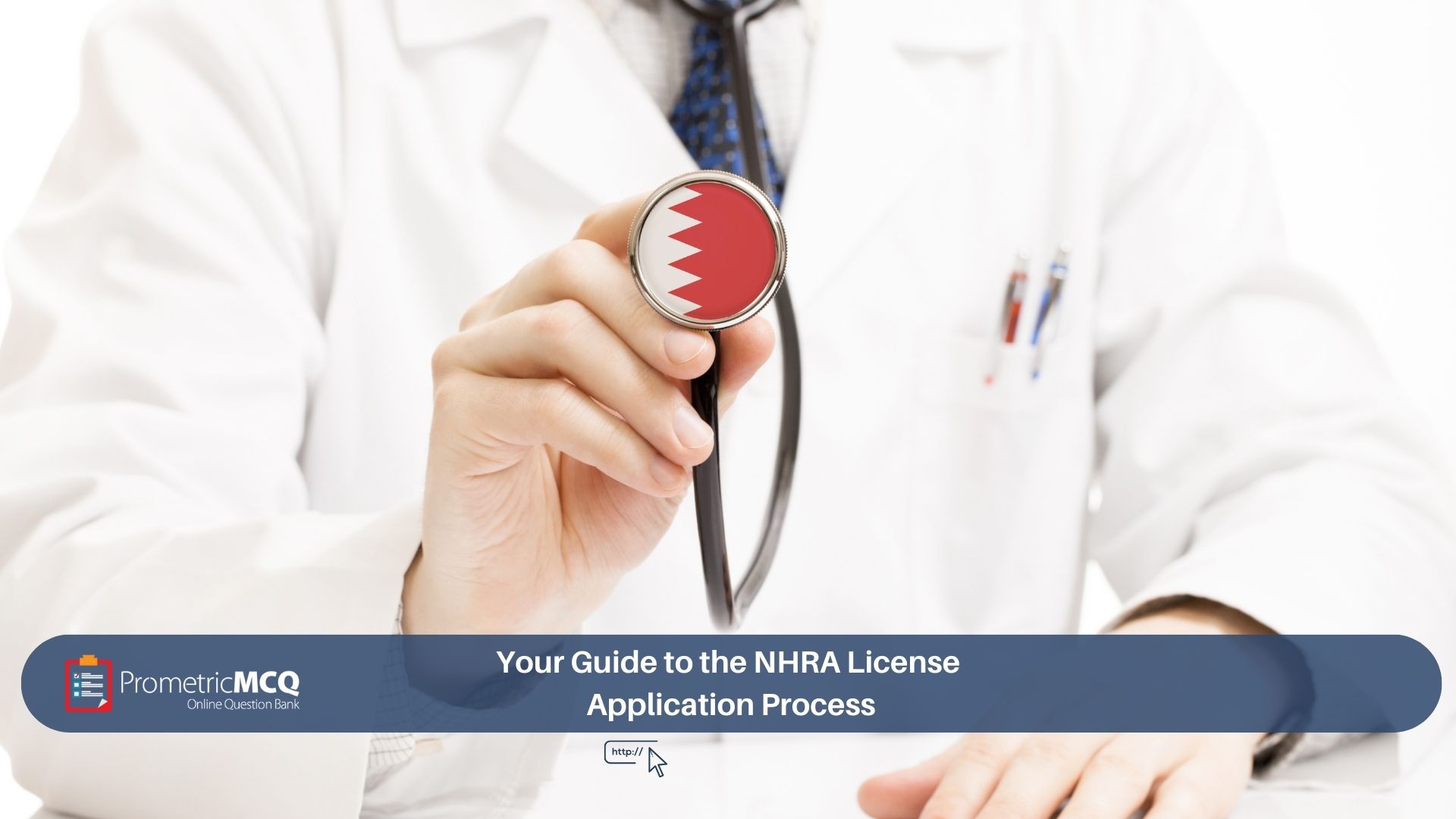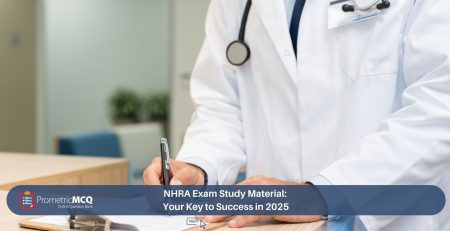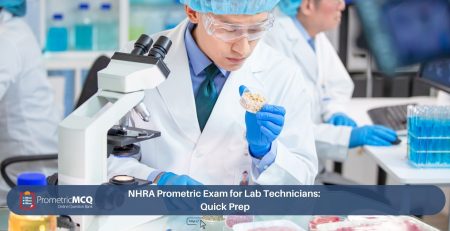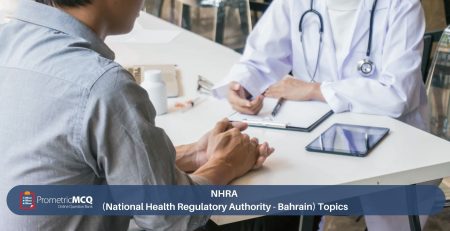
Your Guide to the NHRA License Application Process
fatima@prometricmcq.com2025-09-19T01:48:58+00:00Table of Contents
ToggleYour Guide to the NHRA License Application Process (2025)
Embarking on a healthcare career in the Kingdom of Bahrain is an exciting prospect, promising professional growth in a nation committed to medical excellence. However, before you can contribute your skills to this advanced healthcare system, you must navigate the comprehensive licensing procedure established by the National Health Regulatory Authority (NHRA). This process, while thorough and meticulous, is the cornerstone of Bahrain’s commitment to patient safety and quality care. For international professionals, understanding this multi-stage application process is not just a formality—it is the very foundation of a successful transition.
The journey to obtaining your NHRA license is a linear, step-by-step marathon involving document verification, a challenging licensure exam, and several administrative checkpoints. It is designed to be a definitive validation of your qualifications, experience, and clinical competence. Approaching this process without a clear roadmap can lead to confusion, delays, and preventable errors.
This ultimate 2025 guide has been created to serve as that roadmap. We will provide a granular, step-by-step walkthrough of the entire NHRA license application process, from initial eligibility checks to the final license activation. This article will break down each phase, clarify the purpose of critical components like the DataFlow PSV, and provide a detailed 10-point FAQ to address the most common questions and concerns. Our goal is to demystify the entire procedure, empowering you with the knowledge and confidence to navigate your path to a Bahraini healthcare license with precision and ease.
Key Takeaways on the NHRA Application Process
- It’s a Multi-Stage Journey: The process is not a single application but a series of sequential steps: NHRA application, DataFlow verification, Prometric exam, and license activation.
- Meticulous Documentation is Crucial: The success of your application hinges on providing accurate, complete, and verifiable documents from the very beginning.
- Patience with DataFlow is Essential: The Primary Source Verification (PSV) by DataFlow is often the longest stage. Start it early and be prepared for a process that can take several weeks.
- The Exam is a Key Milestone: Passing the Prometric exam is a mandatory step for most professions and requires dedicated, strategic preparation.
- A Job Offer Finalizes the Process: While you can complete most steps independently, you will need a job offer from a licensed facility in Bahrain to activate your final professional license.
Phase 1: Self-Assessment and Document Collation
This initial phase is about preparation and organization. A thorough effort here will save you significant time and prevent future complications. Do not start the online application until this phase is 100% complete.
Step 1: Confirm Your Eligibility
Before investing any resources, perform a self-assessment against the NHRA’s Professional Qualification Requirements (PQR). You must verify that your education and experience meet the minimum standards for your profession. This generally includes:
- A recognized degree from a reputable institution.
- A minimum of 2-3 years of recent, continuous clinical experience post-qualification for most general professions. This requirement is often higher (5+ years) for specialists and consultants.
- A valid professional license from your home country or last country of practice.
Step 2: Gather and Scan Your Core Documents
This is the most labor-intensive part of the initial phase. You need to gather and create high-quality, color scans of every required document. These will be uploaded to both the NHRA and DataFlow portals.
Essential Document Checklist:
- Valid Passport & Photograph: Ensure your passport has at least one year of validity. Your photograph should be recent, passport-sized, with a white background.
- Educational Credentials: This includes your primary degree (e.g., MBBS, BSN, BDS, BPharm), as well as any postgraduate qualifications (Master’s, PhD, specialty board certifications).
- Academic Transcripts: Official mark sheets or transcripts for all your healthcare degrees are mandatory.
- Internship/House Job Certificate: A certificate confirming the completion of your mandatory rotational internship.
- Professional License(s): A copy of your current, valid license from your home country’s registration or licensing body.
- Certificate of Good Standing (CGS): A critical document, often called a “Letter of Good Standing” or “Verification of Registration.” It must be issued by the same licensing authority that issued your license and must be recent (typically issued within the last 3-6 months). It serves as proof of your clean professional record.
- Experience Letters: These must be comprehensive, official letters from every employer you have listed. Each letter must be on the facility’s letterhead and clearly state your job title, your dates of employment (start and end), and a brief description of your role. It must be signed by an HR representative or medical director and officially stamped.
Phase 2: The Official Application and Verification Journey
With your complete document portfolio in hand, you are now ready to engage with the official systems.
Step 3: Submit Your Application via the NHRA Portal
Your journey begins on the NHRA’s official e-service portal. You will need to create a new user account, then meticulously fill out the online application form. You will be prompted to upload all the documents you prepared in Phase 1. Pay close attention to every detail, as any discrepancy can cause delays. Once submitted, you will pay the initial application processing fee.
Step 4: Navigate the DataFlow Primary Source Verification (PSV)
After a preliminary review of your application, the NHRA will authorize you to begin the PSV process with their designated partner, the DataFlow Group. This is a non-negotiable step.
- What is PSV? It is an in-depth background check. DataFlow contacts your universities, previous employers, and licensing bodies directly to verify that the documents you submitted are authentic.
- The Process: You will create an account on the DataFlow portal for the NHRA, upload your documents again, and pay the verification fees. The cost depends on the number of documents you need verified.
- Timeline: This is often the longest part of the entire application, taking anywhere from 4 to 12 weeks. Be patient, but also proactive. You can track the status of your report online and should respond immediately if DataFlow requests any clarification or additional information.
The DataFlow report is the backbone of your application. A positive, completed report is essential for moving forward. Ensure all contact details for your previous institutions are accurate to speed up the process.
Phase 3: The Licensure Exam – Your Clinical Gateway
Once your DataFlow report is completed and your initial application is approved, you will be deemed “eligible to test.”
Step 5: Book Your Prometric Exam
The NHRA will provide you with an eligibility number, which you will use on the Prometric website to schedule your licensure exam. You can choose from a global network of Prometric test centers. It is wise to book your exam date 4-6 weeks in advance to secure your preferred slot and to give yourself a concrete deadline for your preparation. For a deep dive into the test structure, review our guide to the NHRA exam pattern.
Step 6: Execute a Targeted Exam Preparation Strategy
This is where your clinical knowledge is put to the test. A structured study plan is crucial for success.
- Focus on High-Yield Topics: Identify the core clinical areas for your profession that are most frequently tested.
- Embrace MCQ Practice: The single most effective study method is to work through a large volume of high-quality, case-based MCQs. This hones your clinical reasoning and time management skills. A dedicated resource with profession-specific MCQs packages is your most valuable tool.
- Simulate Exam Conditions: In the final weeks of your preparation, take multiple full-length mock exams under strict timed conditions to build stamina and confidence.
Frequently Asked Questions (FAQs) on the Application Process
The NHRA is the government regulatory body in Bahrain that sets the standards, reviews applications, and issues medical licenses. Prometric is a separate, international company that the NHRA has contracted to administer the computer-based licensure exams on its behalf in secure test centers worldwide.
No. You must first submit your application to the NHRA. They will perform a preliminary review, and only after their approval will you receive the authorization and the correct link to begin the specific DataFlow process for your NHRA application.
This can be a challenging situation. In such cases, you should gather any alternative evidence you have (e.g., employment contracts, salary slips) and draft a formal affidavit or letter of explanation detailing the circumstances. You will need to communicate this issue to both the NHRA and DataFlow for guidance on how to proceed.
After you pass the Prometric exam, the NHRA will issue you an “Eligibility Letter.” This letter is typically valid for one year. You must find employment and begin the license activation process within this one-year window.
A Certificate of Good Standing (CGS) is a letter from the medical council, board, or licensing authority where you are currently registered. It officially states that you are a member in good standing and have no disciplinary actions, malpractice cases, or restrictions on your license. You must contact your home country’s licensing body directly to request this document. It is a critical part of proving your professional integrity.
It is almost always better to pass the exam first. Having an NHRA eligibility letter makes you a much more attractive and “ready-to-hire” candidate for employers in Bahrain. Most employers will not proceed with a formal job offer until you have successfully cleared the licensure exam.
Exemptions are rare but possible in certain circumstances. This is typically for highly qualified senior consultants with specific Western board certifications or for those transferring a valid license from another GCC country with which the NHRA has a reciprocity agreement. This is determined by the NHRA on a case-by-case basis and is not guaranteed.
For an official overview of the regulations, circulars, and licensing requirements, the best external resource is the official National Health Regulatory Authority (NHRA) website itself. It is the primary source of all policies and procedures.
The positive DataFlow report will be sent directly to the NHRA and linked to your application. This, combined with a passing exam result, will allow the NHRA to issue your eligibility letter, which is the final document you need before a prospective employer can apply for your license activation.
Once you have an eligibility letter and a job offer from an NHRA-licensed facility, your employer will take over. They will submit an application to the NHRA to “activate” your license under their facility’s sponsorship. This final step involves paying the license issuance fee and is the point at which your official license to practice is granted.
Conclusion: Your Structured Path to Success
The NHRA license application process is a comprehensive system designed to uphold the integrity and quality of Bahrain’s healthcare sector. While it is detailed and requires careful attention, it is a transparent and navigable journey. By following this step-by-step guide, you can approach the process with a clear, organized strategy. Meticulous documentation, proactive management of the DataFlow verification, and dedicated exam preparation are the pillars of a successful application. Your commitment to this structured approach will be the key that unlocks a rewarding and prosperous professional life in the Kingdom of Bahrain.
Ready to Begin Your Journey with Confidence?
Our comprehensive MCQ packages are tailored for every major healthcare profession, providing thousands of high-yield questions, detailed rationales, and simulated exams to ensure you pass your Prometric exam on the first try.










